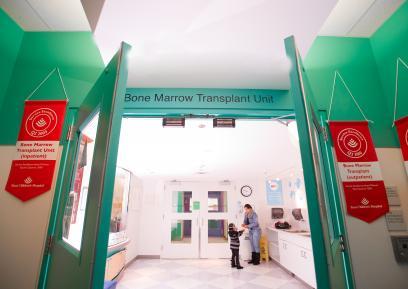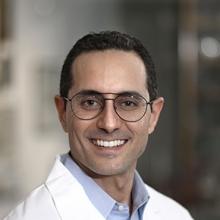
Fourth Year Advanced Training Fellowships Pediatric Stem Cell Transplant Fellowship

The practice of Pediatric Bone Marrow Transplantation has evolved as a distinct and complex subspecialty within the practice of Pediatric Hematology and Oncology. This field, including stem cell biology, transplantation immunology, tumor immunology, hematology and transplant-related infectious disease, encompasses various medical and scientific disciplines.
In recognition of the unique knowledge base required to competently perform bone marrow transplantation, the Foundation of Accreditation of Cellular Therapy (FACT), defines adequate clinical training of an Attending Physician in BMT as a "minimum of one year experience in the management of transplant patients, in both the inpatient and the outpatient settings".
The fellowship training requirements of the American Board of Pediatric Hematology and Oncology do not include sufficient experience with BMT to provide competency, per the current FACT standards, which requires attending physicians in BMT to have one year of supervised training in the management of transplant patients in both the inpatient and outpatient settings. Thus, there is a need for training programs that can provide this expertise, both for fellows trained at Texas Children's Hospital, Baylor College of Medicine and elsewhere.
Goals and Objectives
- Provide an opportunity for trainees in Pediatric Hematology-Oncology to obtain in-depth training in BMT to produce new pediatric Hematopoietic Stem Cell Transplant Physicians.
- Provide and document training that will meet the guidelines for accreditation by FACT as an Attending Physician in a BMT program.
Program Eligibility
Candidates will be asked to provide their curriculum vitae and a statement of career goals and areas of interest. Applications will be reviewed by the Fellowship Committee and candidates will be ranked using NIH system (1- outstanding, 5- unacceptable). Applicants will be contacted for information about acceptance. Suitable candidates will visit for interviews with the committee members and other faculty members, and will be given tours of the relevant sites. If a candidate desires to present a seminar that may be arranged.
Candidates must have completed three years of an accredited U.S. Pediatric Hematology/Oncology Fellowship or its equivalent.
Foreign medical graduates and visa holders
At this time, we are only able to accept J-1 training visas, but not those with H1B visas.
Program Duration
One year
Program Dates
July - June
Curriculum
The curriculum will use the established strengths in clinical, laboratory and research on BMT at Texas Children's Cancer and Hematology Center, Texas Children's Hospital, and the Baylor College of Medicine to provide a broad and in-depth training experience. Training will include clinical, laboratory, didactic, and scholarly activities.
The schedule for the 12-month training program is:
- 4 months inpatient in the BMT unit at Texas Children's Hospital.
- 4 months BMT outpatient clinic/ Research Time
- 1 month laboratory:
- Stem Cell procurement at Texas Children's Hospital
- Stem Cell processing at Texas Children's Hospital
- Immune Function in the Immunology laboratory at Texas Children's Hospital
- Regulatory affairs, GMP, GCP, in the Center for Cell and Gene Therapy
- 1 month Radiation Oncology at the University of Texas M.D. Anderson Cancer Center
- 1 month HLA typing in TMH HLA laboratory
- 2 weeks to attend scientific meetings
- 3 weeks’ vacation
Clinical and Research Training
The fellows gain experience in the inpatient setting of the Pediatric Bone Marrow Transplant / Stem Cell Transplant Unit at Texas Children's Hospital and the outpatient setting of the BMT clinics at Texas Children's Hospital, where they will provide clinical care and lead new patient conferences. Fellows are trained in pertinent "procedures" relevant to BMT, including bone marrow aspiration and biopsy, bone marrow harvesting protocols, peripheral stem cell collection, infusion of transplant products, and radiation oncology (at The University of Texas M.D. Anderson Cancer Center).
A specific requirement of the fellowship is the successful completion of a guided clinical of scholarly research project. The project idea should be developed during the application process and after acceptance, so that research can begin at the start of the fellowship and encompass the entire training year. This project must be different from that which the fellow completed during their pediatric hematology/oncology subspecialty training program. A mentor from among the faculty will guide the research and monitor progress. The product of this scholarly activity should be either: a scientific manuscript submitted for publication, an abstract submitted to a relevant scientific society meeting, or a clinical protocol with an informed consent document submitted for regulatory review.
Laboratory training introduces fellows to methods in the laboratory support of BMT, including the Histocompatibility and Transplantation Immunology Laboratory at Houston Methodist Hospital, and the Stem Cell Processing Laboratories of the Center for Cell and Gene Therapy at Baylor College of Medicine.
Supervisory and Patient Care Responsibilities
Under the direct supervision of an attending physician, fellows learn to diagnose and manage the spectrum of BMT-related issues seen in infants, children, and adolescents on the inpatient and outpatient services.
- All fellows independently perform initial evaluation and management planning for patients of all levels of acuity, including ordering of laboratory and imaging studies as indicated.
- Fellows have a direct one-to-one relationship with their attending faculty and work closely to formulate differential diagnoses and management plans for each patient.
- Fellows will request the expertise of the appropriate consultants and then discuss the diagnostic and treatment plan with these consultants.
- Fellows will meet formally with the attending to establish competencies, set goals for the rotation, and review their performance this information regarding progression of skills and attainment of objectives, as well as future goals, is communicated in writing to the coordinator of the training program who can then pass on this information to the subsequent attendings.
- On-call fellows triage calls after hours for the service and consult their attendings when needed for appropriate disposition.
- On the inpatient BMT service, fellows, along with the attending, lead the multidisciplinary team which includes categorical fellows, nurses, pharmacists, and social workers involved in the care of their patients in daily rounds to formulate the plan of care for their patients.
- Fellows, with supervision from the attending, will also perform any indicated diagnostic procedures.
- The procedures associated are diagnostic and therapeutic lumbar punctures and bone marrow aspiration, biopsy and harvesting. At the beginning of the training, the performance of these procedures is demonstrated by experience practitioners and then initially performed by the fellow only in the presence of such individuals.
- The procedures associated are diagnostic and therapeutic lumbar punctures and bone marrow aspiration, biopsy and harvesting. At the beginning of the training, the performance of these procedures is demonstrated by experience practitioners and then initially performed by the fellow only in the presence of such individuals.
- Some procedures may be performed in the operating room under general anesthesia or in the case of lumbar punctures and bone marrow aspiration biopsy, in the patient floor or outpatient clinic under sedation. Fellows will perform these procedures with appropriate supervision in all settings and learn appropriate sedation or anesthesia practices. A competency verification record of successfully performed procedures which have been observed by the licensed practitioners is maintained by the fellow and turned into the program coordinator when completed.
- Fellows will work with a junior fellow and assume a teaching role for that individual in addition to providing direct patient care. Both will be under the immediate supervision of an attending as well as with all inpatient rotations.
- The fellow will prepare and give presentations related to specific patient problems or topics on rounds or at a variety of multidisciplinary conferences, which commonly form the basis for subsequent treatment recommendations.
Clinical Procedural Requirements
FACT cognitive and procedural skills to be mastered for accreditation of competency in BMT includes the knowledge of indications for BMT, clinical recognition and management of the complications of BMT; evaluation of potential stem cell sources (autologous, sibling, haplo-identical, unrelated, bone-marrow, PBSC, cord); selection of regimens for preparative cytoreduction, immunosuppression and anti-neoplastic therapy, prophylaxis, recognition and treatment of complications of BMT; appropriate use of immune suppressants to control graft versus host disease and graft rejection; stem cell procurement, processing and evaluation; regulatory compliance standards, and documentation methods.
Didactic
- Human Subject Research: Undergo the educational training and become familiar with the conduct of clinical research with the goal of increasing the understanding of the Institutional Review Board in the protection of human research subjects and in the performance of clinical research.
- Texas Children's Hospital Clinical Research Course to increase the knowledge of method for clinical research.
- BMT Conference: weekly clinical rounds with multidisciplinary presence discussing management and rationale for current patients and future plans for incoming patients.
- Grand Rounds; Tumor Boards; Fellow Training Seminars; Team Meetings.
Contact Us
Address: 1102 Bates Ave., Ste. 1570 Houston, TX 77030
Program E-mail: txcheducation@texaschildrens.org

Stem Cell Transplant Fellowship Clinical Director: Baheyeldin Salem, MD

Stem Cell Transplant Fellowship Program Director
YoungNa Lee-Kim, MD
Apply
Fellows interested in this fellowship training program must complete and submit an application along with three letters of reference, a curriculum vitae and a statement of interest.